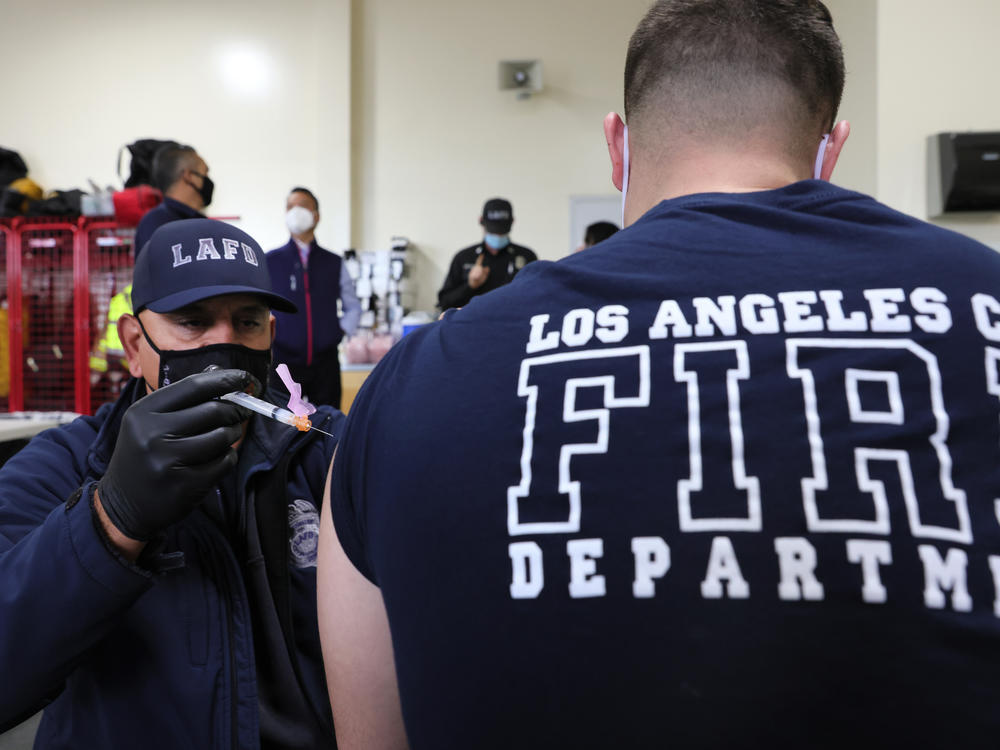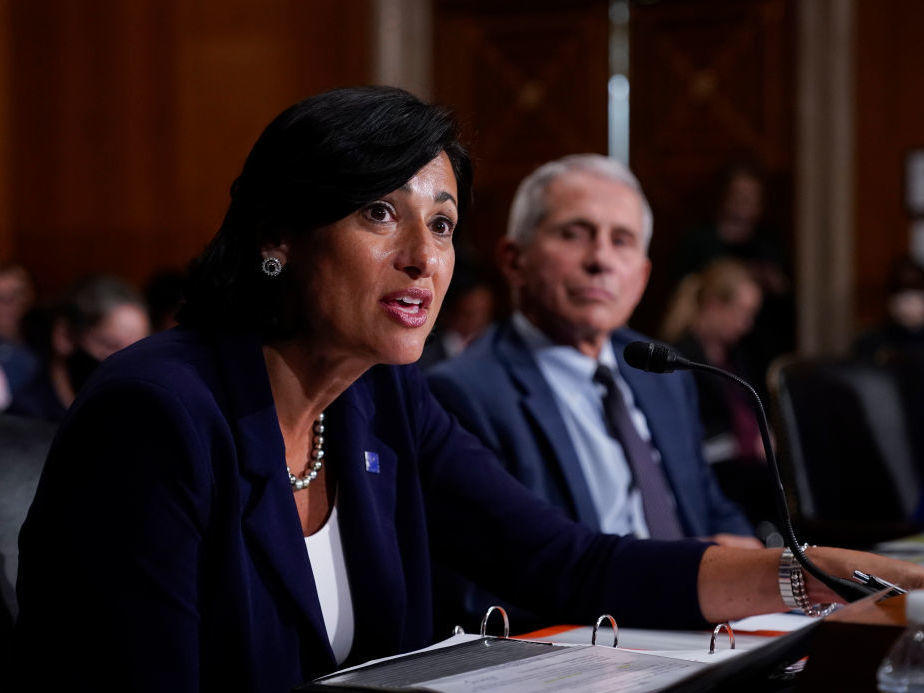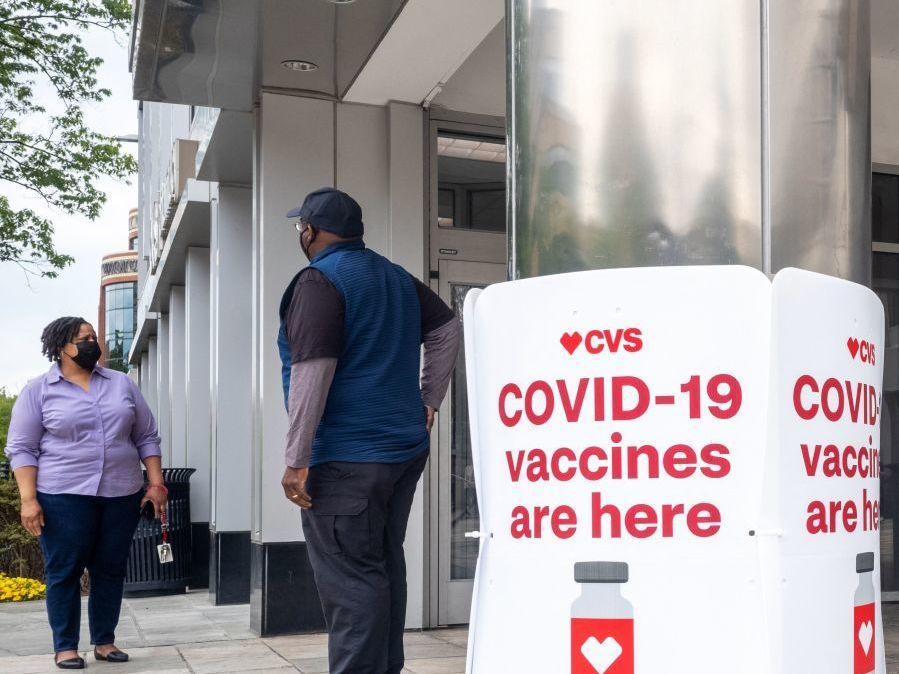Section Branding
Header Content
COVID Booster Shots Are Coming. Here's What You Need To Know
Primary Content
Health officials are preparing to roll out COVID-19 booster shots in the United States this September. According to a plan announced Wednesday, all U.S. adults who received a two-dose vaccine would be eligible for an additional jab of the Pfizer or Moderna vaccine eight months from when they got their second one.
"These booster shots are free," President Biden said in remarks Wednesday afternoon encouraging people in the U.S. to get the shots when it's their turn. "It will be easy. Just show your vaccination card, get a booster. ... It will make you safer and for longer. And it will help us end the pandemic faster."
The timing of the move comes as something of a surprise. It was just a few days ago that the FDA and CDC recommended a third shot of the Pfizer or Moderna vaccine for a more limited population — people who are moderately to severely immunocompromised. The agencies made no mention then of imminently expanding this recommendation to the wider population.
The new plan is contingent on a data review and subsequent endorsement by both the Food and Drug Administration and an advisory committee of the Centers for Disease Control and Prevention.
This week's announcement raises numerous questions about how urgently Americans need boosters, how the rollout will go and more. Here's what we've learned so far:
What's the evidence that vaccinated people need a booster?
Federal health officials are seeing a trend. "The data consistently demonstrate a reduction of vaccine effectiveness against infection over time," the CDC's director, Dr. Rochelle Walensky, said at Wednesday's White House briefing.
The evidence presented at the briefing consists of several recent studies from health systems that have been collecting data on breakthrough infections. These include the New York state health department, the Mayo Clinic and the CDC's reporting system for nursing homes in the U.S., plus Israel's ministry of health abroad.
"We know that even highly effective vaccines become less effective over time," U.S. Surgeon General Vivek Murthy said at the briefing. "It is now our clinical judgment that the time to lay out a plan for COVID-19 boosters is now."
Importantly, the studies do not show any major increases in severe COVID-19 disease, hospitalization or death among fully vaccinated people. However, Walensky noted that data from Israel suggests "increased risk of severe disease amongst those vaccinated early."
Dr. Anthony Fauci, Biden's chief medical adviser, also presented recent evidence showing that a third shot of either mRNA vaccine greatly increased antibodies against the virus that causes COVID-19.
If we need boosters soon, does this mean I'm no longer safe after just two doses?
No, anyone who is fully vaccinated is still very well protected from getting seriously ill from COVID-19. Health officials were emphatic on this point.
For now, anyone who has completed the two-dose mRNA vaccine course is considered fully vaccinated with "a high degree of protection against the worst outcomes of COVID-19," Murthy said.
The rationale for laying the groundwork for boosters in the months ahead is to avert potential COVID-19 deaths in the future if vaccine-induced protection against serious illness wanes.
"We are concerned that the current strong protection against severe infection, hospitalization and death could decrease in the months ahead, especially among those who are at higher risk or who were vaccinated earlier," Walensky said. Booster shots, she said, would "maximize vaccine induced protection."
What if I got the J&J vaccine?
For now, booster shots are being advised for the mRNA vaccines only. A separate booster recommendation for individuals who received a Johnson & Johnson one-dose vaccine is expected soon, health officials say. The J&J vaccine was authorized for use in the U.S. a little later than the others — in March — and data on safety and efficacy of an additional dose is not yet available.
Why are federal officials moving on boosters now if the two-dose vaccines are still protective against hospitalization and death?
Federal officials say they are trying to "stay one step ahead of the virus" by getting started in what will be a months-long endeavor to bolster Americans' immunity.
"It has been an almost reproducible phenomenon with COVID-19. If you wait for something bad to happen before you respond to it, you find yourselves considerably behind," said Fauci. "Better stay ahead of it than chasing after it."
Dr. Robert Wachter, a professor of medicine at the University of California, San Francisco, notes that there's logic to federal officials trying to act early to prevent a worsening of the pandemic.
"Waiting until we start seeing significant numbers of hospitalizations and deaths in vaccinated people seems like the wrong call; trying to stay a bit ahead of the curve seems like the right thing to do, both medically and politically," Wachter wrote in an email to NPR.
The sooner the decision is made, the better for practical logistical reasons, he added.
"It's not like we say 'start boosters' and magically we can give them to 50 million high-risk people — it'll take months to roll them out to nursing home patients, health care workers, immunosuppressed people, and people over 65," Wachter noted, along with millions of others in the U.S. who have received Pfizer or Moderna vaccines.
How will this roll out? Who will get boosters first?
Assuming the FDA gives its blessing, all adults who got one of the mRNA vaccines will be eligible for boosters eight months after their second shot, starting Sept. 20.
Murthy notes that this plan automatically gives priority to high-risk groups.
"The plan ensures that people who were fully vaccinated earliest in the vaccination program will be eligible for a booster first. This includes our most vulnerable populations, like our health care providers, nursing home residents and other seniors," Murthy said.
However, this is only true if a September launch date holds across the U.S. That would be eight months from when the highest priority groups got vaccinated originally. By later in the fall, there's a much wider pool of people who are eight months out from their initial shots.
Giving out a third booster should go more smoothly than the initial bumpy vaccine rollout, says Claire Hannan, head of the Association of Immunization Managers, since the vaccine supply is bigger now and lessons have been learned about how to distribute it quickly. She expects there will be fewer mass vaccination sites and more people getting shots from their local pharmacies, workplaces and doctors.
At Cleveland Clinic Community Care in Ohio, Dr. Michelle Medina, associate chief of clinical operations, says they plan to offer booster doses in the places where they currently give out COVID-19 vaccines, including at community health centers, outpatient pharmacies and specialty clinics.
Is there still scientific debate about the immediate need for these boosters?
Yes. There's much to learn still about the vaccines and how they provide immunity to COVID-19.
One big, open question is how long it takes for vaccine protection against severe disease and death to wane.
Dr. Celine Gounder, an infectious disease specialist and epidemiologist at the NYU School of Medicine, says there's reason to believe that protection from severe disease lasts a good deal longer than protection from a mild-to-moderate respiratory infection.
"Injected vaccines like we have for COVID induce good systemic immunity, in the main organs of the body," she explains, meaning that even if people are getting breakthrough infections in their nose and upper respiratory tract, their lungs are probably still very capable of fighting off the virus.
And while waning antibody levels in the blood are the main measure researchers are using at the moment, other elements of the immune system, such as memory B cells and T cells, are more difficult to measure but also play a crucial role in fighting off infections.
"The T cells generated by the vaccines are holding up amazingly well, with 99% of the hospitalizations being among unvaccinated adults in the US," Dr. Monica Gandhi, an infectious disease physician at UCSF, wrote in a tweet Wednesday. Estimates for the percent of unvaccinated people accounting for COVID-19 hospitalizations vary, but generally fall between 95% and 99%.
"Until you see hard outcomes — like a true increase in severe disease, hospitalization and death — it's unclear that what people are measuring with breakthrough infections is really predictive of waning immunity in the lungs when and where you need it," Gounder says.
But health officials say they're not waiting to find out. And some scientists looking at the current trajectory think an increase in severe breakthrough hospitalizations and deaths is likely unless steps are taken soon.
"I think the growing evidence says that without boosters, that's probably what we'd be seeing by late fall," UCSF's Wachter wrote.
What is the argument against giving out boosters?
Some health experts question whether giving boosters in the U.S. makes the best use of a limited global vaccine supply. They also question whether offering third doses to Americans will make a significant impact on stopping the pandemic.
"Vaccines need to be thought of as population-level interventions," says NYU School of Medicine's Gounder. She argues that getting a higher percentage of people vaccinated will protect a community more than giving already vaccinated people additional shots because it provides "community immunity," which reduces the amount of virus present.
Meanwhile, other parts of the world are in dire need of COVID-19 vaccines. The World Health Organization has criticized countries for giving booster shots when front-line health care workers in poor countries still haven't been vaccinated. "We're planning to hand out extra life jackets to people who already have life jackets and leaving other people to drown," Dr. Mike Ryan, head of WHO's health emergencies program, said at a news conference Wednesday.
President Biden defended the decision to give boosters domestically as a "both, and" situation.
"We can take care of America and help the world at the same time," the president said in his remarks Wednesday. He pointed out that the U.S. has already donated 115 million doses to efforts abroad — more than "every other country in the world combined" — and has pledged to send more than 600 million vaccines in total to other countries.
Is the Sept. 20 start date for boosters realistic? What do federal agencies have to do to approve this before then?
The FDA could take multiple approaches to OK'ing the boosters, former agency officials say. It could first grant a full approval to Pfizer or Moderna for two doses and then issue an emergency use authorization for a booster dose, for instance. Or it could delay granting full approval and ultimately grant it later for two doses and a booster.
Either way, if the FDA follows its usual protocol, the agency would first convene a meeting of its outside advisory committee, as it did when it originally granted emergency use authorization for each COVID-19 vaccine.
"We know in sort of the heat of the moment, and when we're all dealing with a real public health emergency, it becomes almost doubly important that we continually reassess and have the normal processes in place," says Dr. Jesse Goodman, a professor at Georgetown University's School of Medicine who used to be the chief scientist at FDA.
Goodman says he worries that setting a start date for a booster program before the relevant data can be evaluated through the normal federal processes may put "the cart before the horse."
The committee of outside experts typically hears presentations from the government, the product manufacturer and the public. Then, it often votes on whether the FDA should give a given product the green light. The agency doesn't have to follow the committee's advice, but it usually does.
Norman Baylor, a former director of the Food and Drug Administration's Office of Vaccines Research and Review, says putting those committee meetings together in a month — as the administration's Sept. 20 booster start date would imply — is "pushing it."
The agency's interim commissioner, Janet Woodcock, tweeted about the agency's booster plans Wednesday afternoon, though she didn't commit to convening the FDA's Vaccines and Related Biological Products Advisory Committee.
"FDA supports the administration's work to plan for the deployment of additional vaccine doses, or boosters, this fall," she wrote. "FDA will undertake an independent scientific evaluation of the safety and efficacy of boosters for each vaccine."
After an FDA authorization, the CDC's independent vaccine advisory committee would also weigh the evidence and make a recommendation.
Does the U.S. have enough vaccine supply to eventually give a third shot to everyone over 18?
Yes, or at least it will. While the U.S. has plenty of vaccine doses that haven't yet been administered, it doesn't have enough in hand right now to give everyone a third shot immediately.
But more doses are on the way.
The United States struck deals with Pfizer and Moderna earlier this summer to purchase another 400 million doses, which are expected to be delivered starting next month — when the Biden administration says it plans to begin offering boosters — through April of 2022.
That should be enough to give all 258 million U.S. adults a third shot and to vaccinate any children under 12 who are likely to soon be eligible for vaccinations. The tens of millions of leftover shots from the first wave of purchase agreements will likely help prevent scarcity throughout the booster rollout.
It's important to keep in mind that the administration is planning for a gradual rollout with the people who were originally vaccinated earliest going first.
"If the booster is based upon elapsed time since completion of the initial series, you wouldn't need all the doses to be on hand," says Hannan, of the Association of Immunization Managers. "So assessing the supply is a little complicated. But suffice to say, we have plenty of supply right now."
Jeffrey Zients, the White House coronavirus response coordinator, says the Biden administration is "ready" for boosters.
"We have enough vaccine supply for every American," Zients says. "It will be just as easy and convenient to get a booster shot as it is to get a first shot today."
NPR's Allison Aubrey and Rob Stein contributed to this report.
Copyright 2021 NPR. To see more, visit https://www.npr.org.



